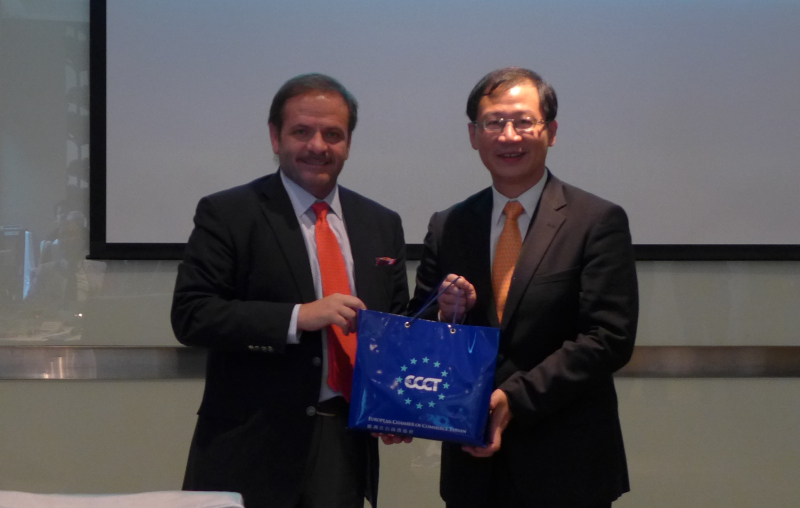Lunch with Taoyuan County Mayor Wu

Taoyuan County is already one of Taiwan's most dynamic and prosperous metropolitan areas and the aerotropolis will build on this. The aerotropolis will be Taiwan's largest infrastructure project since 1970's. It is expected to attract over US$16 billion in investment, create 300,000 new jobs and generate economic revenue of over US$75 billion. New land covering 47.9 square kilometres will be developed. If the existing Taoyuan international airport is included, the total area of the aerotropolis will cover 68.5 square kilometres.
Taoyuan is an ideal location for the aerotropolis not only because of the Taoyuan airport but also its central location both in Asia and as the centre of the largest industrial corridor in Taiwan. Taoyuan County is home to Taiwan's largest and most extensive industrial base. In the immediate vicinity there are 29 industrial parks covering multiple industries and corporate headquarters. Both of Taiwan's largest airlines have their headquarters in Taoyuan County along with airline maintenance companies, automotive manufacturers, high tech, logistics, and other service companies.
The area also has an extensive transportation network including recently-upgraded highways, the airport, regular and high-speed rail networks, while electric buses and two new metro rail lines with 20 stations are being planned. This includes the Airport MRT, already under construction and expected to be completed by 2015, which will run from the main station in Taipei all the way to Zhongli. When the aerotropolis is completed it should be possible to reach some kind of green public transport system within a 10 minute walk, according to Wu. Wu also boasted that Taoyuan County has a very young population - the average age younger than the national average.
Given its importance as an economic hub, on 25 December 2014, the districts and governments of Taoyuan County and city will be merged and reorganised as Taiwan's sixth special municipality or "megacity" named Taoyuan City. The special municipality status will give the city a greater autonomous budget and more control over projects.
Wu's vision is to transform the Greater Taoyuan area into a smart, "green and resilient city" that incorporates sustainable principles into the planning and the development of projects in terms of environment, society and economics. This aerotropolis project aims to achieve a new level of quality in terms of sustainability and "LOHAS" residential living, to promote high value-added industrial clusters and to enable smooth flows of people, products, capital and information. The government has set sustainable development guidelines and all developments are required to meet the highest standards. The most modern and advanced urban design, infrastructure technologies, building technologies and communication and transportation technologies are expected to be realised in this project. To help realize his vision, Wu's government has invited former Vice President Siew and 12 other experts to be part of an advisory committee on the project.
When this project is completed Wu hopes that Taoyuan Aerotropolis will become one of the major new logistics, finance, and business & trading operation centres in the Asia Pacific region.
The aerotropolis will include five main zones: an administration and finance zone, a culture, creativity and science and R&D zone, a "Gateway" zone, a logistics and trading zone and a residential zone.
The finance zone will include an international financial centre, international banks and venture capitals firms. The residential zone will be a "LOHAS quality residence zone". Recreational facilities and theme parks will be integrated into the project. The culture, creativity, science and R&D zone will include an international enterprise R&D campus, international entrepreneur and incubator campus, a centre of integrated culture & entertainment production and performance facility. It will also contain commercial areas for retailers. The Gateway zone will include a convention centre and a conference and exhibition centre, theme parks, quality agricultural products exhibition & trading centres. The international logistic campus will include an air cargo reconsolidation hub, international logistics and cargo headquarters. The residential zone will include 21 artificial lakes and public facilities will need to account for at least 35% of total space developed to make the development livable.
Zones 3 and 4 will be controlled by Taoyuan government. No low end manufacturing industries will be allowed in the zones. Only high value-added, low polluting, low energy and low water consuming industries will be allowed.
In his speech Wu outlined a timeline for the project. The urban planning began in June. The process to acquire new land will begin by December this year. Public land is expected to be available for development by 2016 and private land by 2019. The procurement process has already started. Tenders will be announced late this year or early next year for infrastructure as well as legal and other consultancy projects. Construction should be able to start in 2016.
